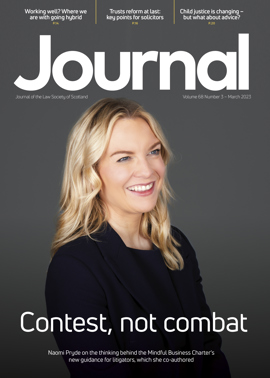Tradecraft tips: March 2023

Empathy
A client was buying a house which was a listed building. The seller had carried out unauthorised alterations and the resulting delay was causing no end of anxiety to the client as he had sold his existing house in anticipation of the purchase.
A former employer of mine once said that buying a house should be an enjoyable experience, but on this occasion it was little short of a nightmare. When I indicated to the client that the problem was also waking me up at 6am every day he simply did not believe me. No solicitor likes seeing his client struggling in such circumstances. The only saving grace was that the client could see that I was using my imagination in trying to deal with the situation.
In such impasse situations, clients are sometimes tempted to take matters into their own hands. They buttonhole anyone who will listen to them, and if someone comes up with a weird and wonderful solution which is what the client wants to hear, you have a job on your hands to explain to them why their proposal simply will not work. Not every problem in life has a solution, but you have to explain the situation to the client in detail and outline the possible courses of action and the pluses and minuses of each of them. Even if this does not alleviate the client’s anxiety, at the least it lays the foundations of your defence if matters reach the stage of a formal complaint. If you have done as much as and possibly more than any other solicitor would have done in a similar situation, surely you cannot be blamed if the problem proves to be incapable of resolution.
Notarising documents
My advice here is simple. Just don’t do it. Clients bring us documents from countries all over the world and expect us to know exactly what is required in all cases, when more often than not we have even less idea than they have. I once had to notarise documents for a couple who were intending to get married while they were on holiday in Cyprus. I advised them to fax the documents out to Cyprus right away to make sure that everything was in order. I did not want them coming back weeks later because the notarising was not done correctly, and saying “Not only did you ruin our holiday, you ruined our wedding as well.”
If you must notarise documents, ask the clients to scan them to you in advance so that you can try to work out exactly what is required, rather than only seeing them for the first time when the clients are sitting on the other side of your desk. I had a case recently where I spent 90 minutes studying various sources of information, only to come to the conclusion that a notary public simply had no part to play in the process of certification in question. I was quite happy to expend this effort if it avoided a situation where the clients gained the impression that I did not know what I was doing.
Charging fees
The obligation to quote fees or the hourly charging rate in advance has narrowed down the possibility of clients complaining that the fee was much more than they had anticipated, but if you find yourself running into complications you should inform the clients that the fee is going to exceed the estimate and not just assume that the client will anticipate a higher fee.
A number of years ago I changed my car and the insurance premium shot up. When I rang up to query this, the man at the other end looked at my details on his computer screen and said: “You have been with us a long time, Mr Swanson; in fact you have been with us since before I was born.” There was a legitimate reason for the increased premium but I was then offered a £60 discount. I switched the cover to another company. Strangely enough, if I had not been offered a discount I would have left the cover with the original insurers but I felt that if there was a discount going I should have received it automatically. If a client complains about a fee, be very cautious about offering a discount in case the client takes this as evidence that they have been overcharged. Try to resolve the matter by other means, possibly by allowing extended credit or even offering to do a free will.
Perspectives
Features
Briefings
- Civil court: No rule against redaction
- Corporate: Privileged or confidential – who can access
- Intellectual property: Big tech, AI and enforcement
- Succession: Non face-to-face will instructions; form C1
- Agriculture: “Route map” for agricultural reform
- Parking: About this ticket…
- In-house: Caring for the carers







